Protein is the cornerstone of life. It powers every process in your body, from building muscles to producing hormones. But what happens when your body doesn’t get enough? Protein deficiency, although often overlooked, can have widespread effects on your health. Whether it’s due to dietary choices, medical conditions, or socioeconomic factors, understanding protein deficiency is the first step toward combating it effectively.
Table of Contents
The Role of Protein in the Body

Why Protein is Essential
Protein isn’t just a dietary buzzword; it’s a biological necessity. It forms the building blocks for:
- Muscles and tissues: Proteins repair and maintain these structures.
- Enzymes and hormones: They regulate countless processes, from digestion to mood.
- Immune system: Protein builds antibodies that protect you from diseases.
Without enough protein, these critical systems falter, leaving you vulnerable.
How Protein Works in the Body
When you consume protein-rich foods, they’re broken down into amino acids during digestion. These amino acids are like tiny workers, each assigned a specific task—repairing muscles, transporting nutrients, or building enzymes. If there’s not enough protein in your diet, these workers can’t do their jobs, leading to symptoms of deficiency.
What is Protein Deficiency?
Definition of Protein Deficiency
Protein deficiency occurs when your body doesn’t receive or can’t utilize adequate protein. The severity can range from mild to severe, with long-term deficiencies leading to debilitating conditions like kwashiorkor or marasmus.
Types of Protein Deficiency
- Kwashiorkor: Severe deficiency, often seen in children in developing countries, characterized by swelling and an enlarged liver.
- Marasmus: A chronic lack of calories and protein, leading to extreme weight loss and weakness.
- Latent deficiency: Mild but persistent lack of protein, which can still cause health problems over time.
Causes of Protein Deficiency
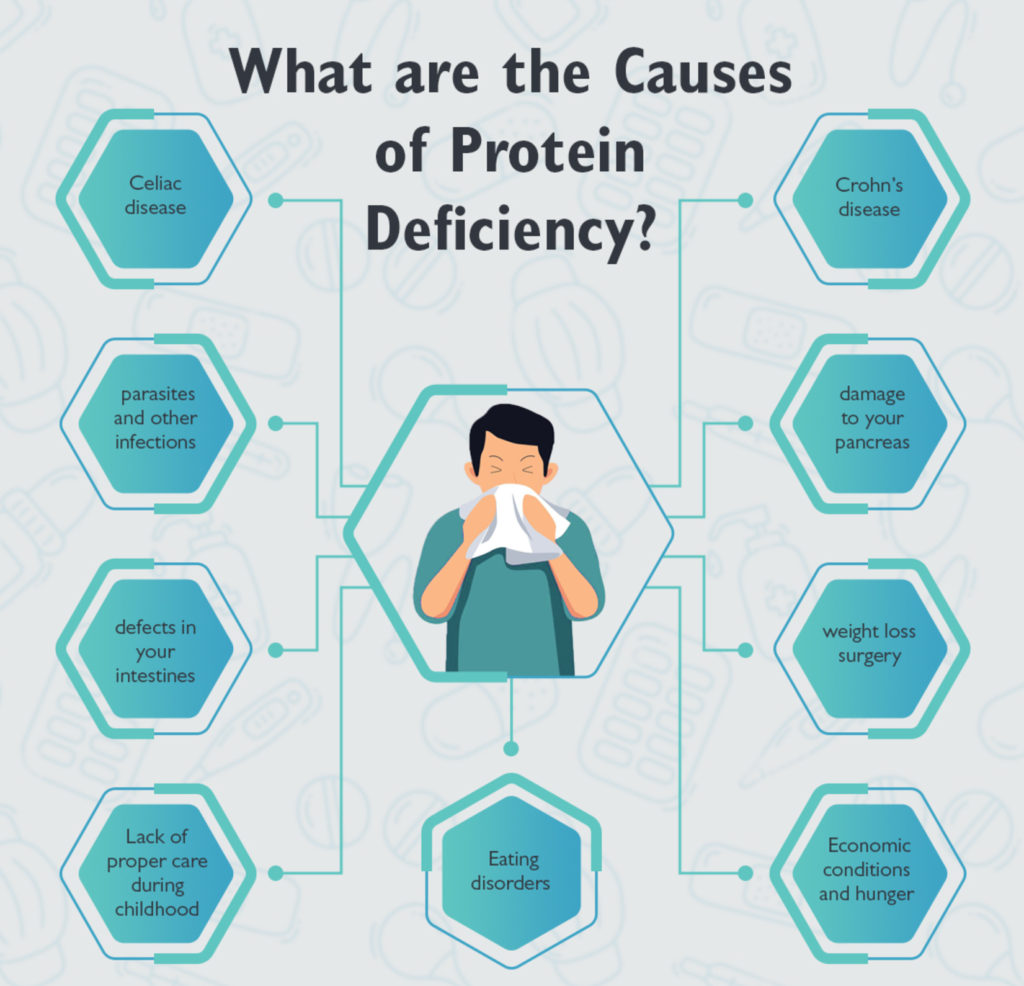
Dietary Factors
A primary cause of protein deficiency is insufficient intake of protein-rich foods. People who consume highly restrictive diets, such as extreme low-calorie or low-protein fads, are at higher risk.
Health Conditions Leading to Protein Deficiency
Some conditions, like celiac disease or chronic kidney disease, impair protein absorption. These conditions require medical intervention beyond dietary adjustments.
Social and Economic Causes
In many regions, poverty and food insecurity limit access to protein sources like meat, dairy, and legumes. Geographic disparities also mean that certain populations face higher risks due to agricultural limitations.
Symptoms of Protein Deficiency

Physical Health Symptoms
One of the earliest signs is muscle wasting, as the body breaks down muscles to meet its protein needs. This leads to fatigue, weakness, and weight loss. In severe cases, edema, or swelling, may develop due to a lack of proteins that regulate fluid balance.
Skin, Hair, and Nail Health
Lack of protein can make your hair thin, dull, and brittle, while nails may become weak and split. Skin might lose its elasticity, becoming dry and prone to cracks.
Immune System Impact
With insufficient protein, your body can’t produce enough white blood cells, leading to frequent infections and slow recovery times.
Impact on Mental and Emotional Health
Did you know protein deficiency can affect your brain? It’s true—proteins help produce neurotransmitters. A deficiency might cause anxiety, irritability, and difficulty concentrating.
Children’s Growth and Development
For children, the impact is more pronounced. Protein deficiency can stunt growth, delay cognitive development, and lead to life-threatening conditions like kwashiorkor.
Risk Factors for Protein Deficiency
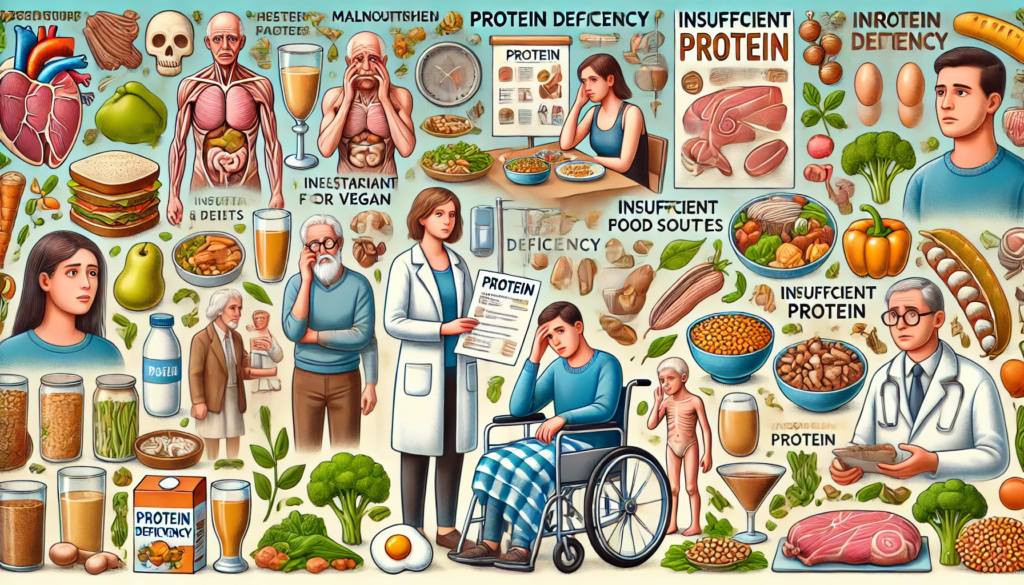
Demographic Risk Factors
Certain groups are more susceptible:
- Children and teenagers: Growing bodies need more protein.
- Elderly individuals: Age-related appetite loss and reduced protein metabolism.
- Pregnant women: Additional protein is required for fetal growth.
Dietary and Lifestyle Choices
Vegans and vegetarians who don’t consume enough varied sources of protein are at risk. Similarly, individuals consuming high-carb but low-protein diets may unknowingly fall short.
Diagnosing Protein Deficiency
Self-Awareness of Symptoms
Monitor for unexplained fatigue, frequent illnesses, and visible changes in hair or skin.
Medical Diagnostic Methods
Blood tests measuring albumin levels or other protein indicators can confirm a diagnosis. Nutritionists also evaluate dietary habits to identify potential deficiencies.
How to Prevent Protein Deficiency
Dietary Strategies
Incorporate foods like chicken, eggs, fish, tofu, lentils, quinoa, and nuts. For vegetarians, pairing foods (e.g., beans with rice) can provide complete proteins.
Educating at-Risk Groups
Awareness campaigns and accessible nutrition education can make a big difference, especially in vulnerable populations.
Treating Protein Deficiency
Reversing Deficiency through Diet
Recovery starts with reintroducing protein-rich foods gradually. This ensures your body adjusts without complications.
Medical and Professional Interventions
Severe cases may require hospitalization and nutritional therapy, where protein and other nutrients are delivered through supplements or medical-grade feeds.
Protein in a Balanced Diet
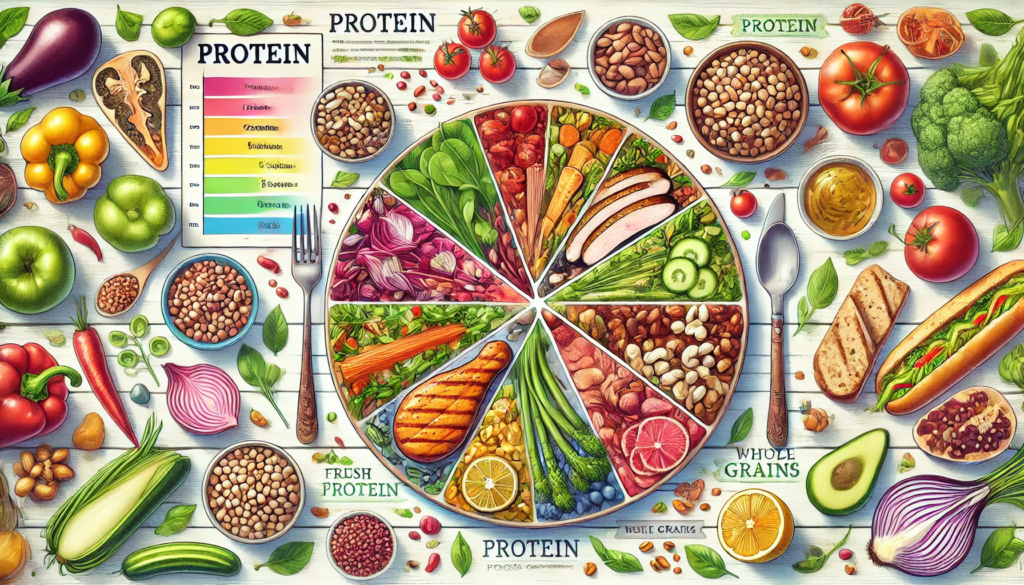
Daily Protein Requirements
On average:
- Adults: 0.8g/kg of body weight.
- Athletes: 1.2–2.0g/kg.
- Pregnant women: Around 25g extra daily.
Healthy Sources of Protein
Animal-based: Eggs, chicken, fish.
Plant-based: Soy, lentils, chickpeas, quinoa.
Conclusion
Protein deficiency is a silent threat that can lead to severe health complications if not addressed. By maintaining a balanced diet and recognizing symptoms early, you can ensure your body stays healthy and strong. Don’t underestimate the power of this essential nutrient—it truly is the building block of life.
Frequently Asked Questions
What are the key symptoms of protein deficiency?
Fatigue, muscle loss, hair thinning, and infections.
How does protein deficiency impact mental health?
It can cause mood swings and cognitive difficulties.
Can protein deficiency lead to long-term health issues?
Yes, including muscle atrophy, immune disorders, and developmental delays in children.
What are easy ways to increase protein in a vegetarian diet?
Include beans, lentils, quinoa, soy, and nuts.
Is protein deficiency reversible?
Absolutely! With dietary changes and medical care, recovery is possible.
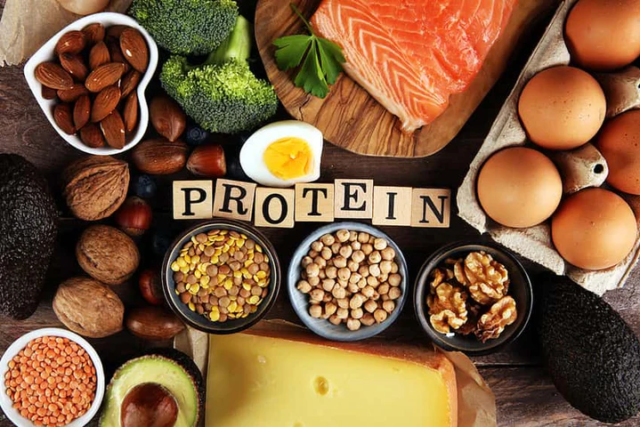
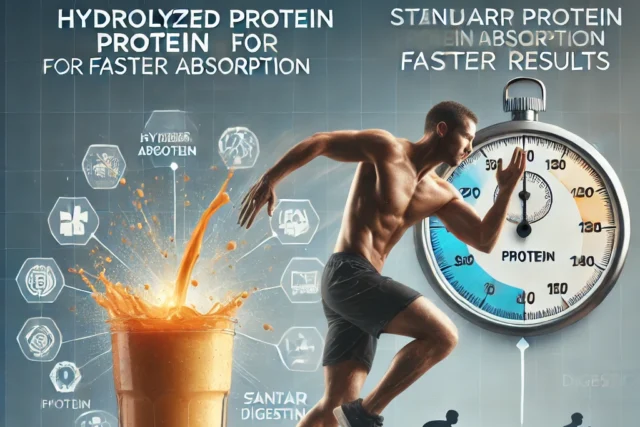

MOST COMMENTED
Animal-Based Proteins / Casein Protein / Dietary Protein / High-Protein Diets / Pea Protein / Plant-Based Proteins / Protein / Protein Deficiency / Protein Supplements / Proteins / Whey Protein / Whey Proteins
Is Protein Powder Safe for Teenagers and Children?
Animal-Based Proteins / Casein Protein / Dietary Protein / High-Protein Diets / Pea Protein / Plant-Based Proteins / Protein / Protein Deficiency / Protein Supplements / Proteins / Whey Protein / Whey Proteins
Unlock the Power of Proteins for Optimal Gut Health
Multivitamin
Total Health: Multivitamin for Active Lifestyles
Multivitamin
WellnessFusion: Complete Multivitamin Support
Dietary Supplement
Revitalize Your Health: The Magic of Red Yeast Rice Capsules
Foot care / Foot Health
Revitalize Your Foot Care Routine: Essential Tips for Optimal Foot Health
Foot Problem / Diabetics / Foot Health
Diabetics: Mastering Footwear Selection for Enhanced Foot Health and Ultimate Comfort
Exercises and Footwear Tips for Hammertoe Relief / Foot care / Foot Health / Foot Pain / Foot Problem / Hammertoes
Unlock Effective Exercises and Footwear Tips for Hammertoe Relief
Hammertoes / Foot Health / Foot Pain / Foot Problem
Unlock Relief: Essential Guide to Hammertoes Causes, Symptoms, and Treatments
Foot Problem / Foot Health
Revolutionize Your Recovery: Natural Remedies for Plantar Fasciitis – Fresh Home Keepers